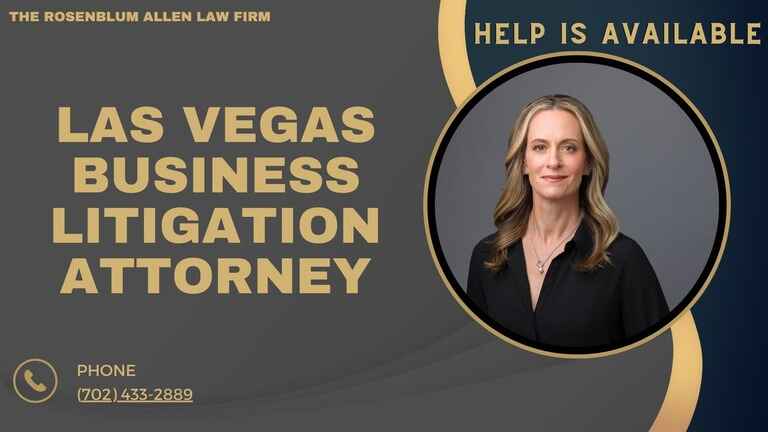Finding the Right Las Vegas Business Litigation Attorney for Your Needs
Understanding Business Litigation
Definition of Business Litigation
Business litigation refers to legal disputes that occur in the context of business operations. These disputes can involve various parties, including business partners, employees, customers, and even competitors. The primary aim of business litigation is to resolve conflicts through legal means, whether through negotiation, mediation, or court proceedings.

 Common Types of Business Litigation
Common Types of Business Litigation
Business litigation can encompass several areas. Here are some common types:
Contract Disputes
These occur when one party fails to meet the terms of a contract. Common issues include breaches of agreement, non-performance, or disagreements over contract interpretations.Partnership Disputes
Conflicts can develop between business partners regarding management decisions, profit sharing, or operational disagreements. These disputes can disrupt the business’s day-to-day functioning.Employment Issues
Disputes related to employment can include wrongful termination, discrimination, or violations of labor laws. Both employers and employees can seek legal action to protect their rights.Intellectual Property Disputes
These involve conflicts over patents, trademarks, copyrights, and trade secrets. Protecting intellectual property is essential for businesses, as it can directly impact their competitive edge.Shareholder Disputes
Conflicts may develop among shareholders regarding management practices, profit distribution, or company direction. These disputes can affect the overall health of a business.
Why You Might Need a Business Litigation Attorney
The Importance of Legal Representation
Having legal representation in business litigation is important for several reasons:
Protecting Your Rights
An attorney can help make sure your rights are safeguarded throughout the litigation process. They can guide you on the best course of action to protect your interests.Navigating Complex Legal Processes
Business litigation can be intricate. Attorneys understand the legal landscape and can help navigate it effectively. They know the laws, regulations, and procedural requirements involved.Achieving Favorable Outcomes
Experienced attorneys can negotiate on your behalf, aiming for the best possible results. Whether through settlements or court victories, their goal is to achieve positive outcomes.Avoiding Costly Mistakes
The legal process is full of potential pitfalls. An attorney can help you avoid common mistakes that could jeopardize your case or lead to unfavorable results.
Qualities to Look for in a Las Vegas Business Litigation Attorney
Experience and Expertise
When searching for a business litigation attorney, keep the following in mind:
Relevant Case Experience
Look for an attorney who has handled cases similar to yours. Their background can provide insights into how your case may unfold.Familiarity with Nevada Business Laws
Understanding state-specific laws is vital. An attorney well-versed in Nevada business regulations can provide the best legal guidance.Track Record of Success
Review their history of successful cases. This can give you confidence in their ability to handle your legal matters effectively.
Communication Skills
Strong communication is key in legal representation. Here’s what to look for:
Transparency and Responsiveness
Your attorney should be open about the process and responsive to your inquiries. You need to feel informed and engaged at every stage.Ability to Explain Complex Concepts
Legal jargon can be overwhelming. A good attorney can break down complicated legal concepts into understandable terms, ensuring you grasp the details.Negotiation Skills
Strong negotiation skills are vital, especially when settling disputes outside of court. Your attorney should advocate effectively on your behalf.
Client-Centered Approach
A client-centered attorney focuses on your needs. Consider these qualities:
Understanding Your Business Needs
An attorney should take the time to understand your business and its unique challenges. This understanding will shape their legal strategies.Personalized Legal Strategies
One-size-fits-all approaches don’t work in business litigation. Look for an attorney who tailors their strategies to fit your specific situation.Commitment to Client Satisfaction
A good attorney prioritizes your satisfaction and works hard to meet your expectations. They should be genuinely invested in your success.

The Process of Hiring a Business Litigation Attorney
Initial Consultation
The initial consultation is a vital first step in hiring a business litigation attorney. Here’s what you can expect:
What to Expect During the First Meeting
This meeting is typically informal. It’s an opportunity for you to discuss your case and for the attorney to understand your situation. Be prepared to share key details about your business and the dispute you’re facing.Preparing Questions to Ask
Going in with questions can help you assess the attorney’s fit for your needs. Here are some examples:- What experience do you have with cases like mine?
- What strategies do you recommend for my situation?
- How do you communicate with clients?
- What is your fee structure?
Assessing Compatibility
Chemistry matters. You want an attorney who listens to you and makes you feel comfortable. Pay attention to how they respond to your concerns. Are they respectful and understanding?
Fee Structures and Costs
Understanding the costs involved is crucial before hiring an attorney. Here’s a breakdown of common fee structures:
Hourly Rates vs. Flat Fees
Some attorneys charge by the hour, while others may offer flat fees for specific services. Knowing how they charge can help you budget effectively.Understanding Retainers and Billable Hours
A retainer is an upfront payment to secure the attorney’s services. Billable hours are the time spent working on your case. Make sure to clarify how these are calculated.Potential Additional Costs
Keep in mind that litigation can incur additional costs, such as court fees, expert witness fees, and costs for document preparation. Ask your attorney to provide an estimate of these potential expenses.
How a Business Litigation Attorney Can Assist You
Pre-Litigation Services
Before a case goes to court, an attorney can provide valuable pre-litigation services. These may include:
Negotiation and Mediation
Many disputes can be resolved without going to court. Attorneys can negotiate terms that are acceptable to both parties, saving time and money.Drafting and Reviewing Contracts
A skilled attorney can help draft contracts that protect your interests. They can also review existing contracts to identify potential issues before they become disputes.Providing Legal Advice
Sometimes, a simple legal question can save you from future trouble. An attorney can provide guidance on business practices, compliance, and other legal matters.
Litigation Process
If litigation is unavoidable, an attorney will guide you through the entire process. Here’s what to expect:
Filing a Lawsuit
Your attorney will prepare and file the necessary legal documents to start the lawsuit. This includes gathering evidence and drafting a complaint.Discovery Phase
This phase involves exchanging information between parties. Your attorney will help gather evidence, take depositions, and prepare interrogatories. This process is vital for building a strong case.Trial Preparation and Representation
If your case goes to trial, your attorney will prepare you for what to expect. They will develop strategies, present evidence, and represent you in court.Post-Trial Actions
After a verdict is reached, there may be further actions to take. This could involve filing appeals or ensuring the terms of a settlement or judgment are met.
Finding the Right Las Vegas Business Litigation Attorney
Researching Potential Attorneys
Finding the right attorney requires some research. Here are steps to guide you:
Online Reviews and Testimonials
Check online reviews to gauge the experiences of past clients. Look for trends in feedback that indicate the attorney’s strengths and weaknesses.Referrals from Other Business Owners
Ask fellow business owners for recommendations. Personal referrals can lead you to trustworthy attorneys who have proven themselves in similar situations.Bar Association Resources
Many local and state bar associations offer resources to help you find qualified attorneys. They may also have lists of attorneys who specialize in business litigation.
Scheduling Consultations
Once you have a list of potential attorneys, it’s time to schedule consultations. Here’s how to make the most of these meetings:
Making the Most of Your Meeting
Come prepared with documentation related to your case. This can include contracts, emails, or any other relevant information. The more details you provide, the better the attorney can assess your situation.Evaluating Attorney Recommendations
After meeting with several attorneys, reflect on their recommendations and your comfort level with each one. Which attorney made you feel most at ease? Whose approach aligns best with your needs?

Tips for Working Effectively with Your Business Litigation Attorney
Clear Communication
Establishing clear communication is essential for a successful attorney-client relationship. Here’s how to encourage effective communication:
Be Honest and Transparent
Share all relevant details with your attorney. Even if something seems minor, it might be important for your case. Honesty builds trust and helps your attorney provide better advice.Ask Questions
Don’t hesitate to ask questions if you don’t understand something. Your attorney is there to help, and they appreciate clients who are engaged and informed.Set Expectations
Discuss your expectations upfront. This includes timelines, potential outcomes, and how often you want updates. Setting clear expectations helps avoid misunderstandings later.
Staying Organized
Keeping organized records can make the process smoother. Here’s how to stay on top of things:
Maintain a Case File
Create a dedicated folder for all documents related to your case. This includes contracts, emails, and any correspondence with your attorney.Track Important Dates
Keep a calendar with important deadlines, such as court dates or deadlines for filing documents. This will help you stay on track and avoid missing critical timelines.Document Conversations
After meetings or phone calls with your attorney, jot down key points discussed. This will help you remember important details and follow up on any action items.
Understanding the Potential Outcomes of Business Litigation
Possible Results
When engaging in business litigation, understanding the potential outcomes can prepare you for various scenarios. Here are some common results:
Settlement
Many cases are settled before they reach trial. A settlement can save time and legal expenses for both parties. Your attorney will negotiate the terms to find a mutually agreeable solution.Judgment in Your Favor
If the case goes to trial, a favorable judgment means the court agrees with your position. This could result in financial compensation or other remedies as deemed appropriate.Judgment Against You
Sometimes, the court may rule in favor of the opposing party. If this occurs, your attorney can discuss next steps, including the possibility of an appeal.Mediation or Arbitration
Some cases may be directed toward mediation or arbitration instead of traditional litigation. These alternative methods can provide quicker resolutions with less formal procedures.
Factors Influencing Outcomes
Several factors can affect the outcome of your case:
Strength of Evidence
The quality and quantity of evidence presented can significantly impact the court’s decision. Strong evidence can bolster your case, while weak evidence can undermine it.Legal Representation
Having an experienced attorney increases your chances of achieving a favorable outcome. Their knowledge of the law and litigation strategies plays a critical role.Willingness to Compromise
Being open to negotiation can lead to better outcomes. Many disputes can be resolved through compromise, avoiding lengthy and costly litigation.

The Importance of Being Proactive in Business Litigation
Taking Preventative Measures
Taking proactive steps can help avoid litigation altogether. Here are some strategies:
Regular Contract Reviews
Periodically review contracts to ensure they still meet your needs and comply with current laws. Keeping contracts updated helps prevent disputes.Employee Training
Provide training on compliance and workplace policies to minimize employment-related issues. Educating employees can reduce misunderstandings and potential legal conflicts.Open Communication Channels
Encourage open communication within your business. Establishing a culture of transparency can help identify issues before they escalate into legal disputes.
Recognizing Early Warning Signs
Being aware of early warning signs can help you act before a situation escalates. Here are some indicators:
Frequent Disagreements
If you notice increasing conflicts among partners or employees, it may be time to address underlying issues. Early intervention can prevent further escalation.Negative Feedback from Clients
If clients express dissatisfaction, it’s essential to investigate and resolve any concerns. Addressing client feedback can help maintain positive relationships and avoid disputes.Unclear Agreements
If contracts or agreements are vague or poorly defined, this can lead to misunderstandings. Taking the time to clarify terms can prevent future conflicts.

Breaking It Down
Navigating business litigation can be a challenging experience, but you don’t have to face it alone. By understanding the process, knowing how to work with your attorney, and being proactive, you can safeguard your business interests. A skilled Las Vegas business litigation attorney can guide you through the challenges of the legal system, helping you achieve the best possible outcomes. Remember, taking the right steps today can help secure a more successful tomorrow for your business.

Frequently Asked Questions
What should I look for when hiring a business litigation attorney?
When hiring a business litigation attorney, consider their experience in handling cases similar to yours, their track record of success, and their familiarity with local laws and court procedures. Communication style is also important; ensure they are responsive and clear in their explanations.
How can I prepare for my first meeting with a business litigation attorney?
To prepare for your first meeting, gather all relevant documents related to your case, including contracts, emails, and correspondence. Be ready to discuss the details of your situation and your desired outcomes. This preparation will help your attorney understand your needs and provide more accurate advice.
What are the costs associated with business litigation?
The costs of business litigation can vary significantly depending on factors like the complexity of the case, attorney fees, and court costs. Common expenses may include attorney retainers, filing fees, and costs for expert witnesses or discovery. It’s essential to discuss these costs upfront with your attorney.
How long does business litigation typically take?
The duration of business litigation can vary widely. Simple cases may be resolved within a few months, while more complex disputes can take years to resolve. Factors influencing the timeline include the case’s complexity, the court’s schedule, and the willingness of parties to negotiate.
Can I represent myself in business litigation?
While it is possible to represent yourself in business litigation, it is generally not advisable. Legal proceedings can be complicated, and having a knowledgeable attorney can significantly improve your chances of a favorable outcome. An attorney can navigate the legal system, advocate on your behalf, and provide valuable insights.
What happens if I lose my business litigation case?
If you lose your case, the court may order you to pay damages or legal fees to the winning party. Your attorney can discuss the possibility of an appeal if you believe there were errors in the trial process. It’s essential to understand the potential financial implications of a loss.
How can I avoid business litigation in the future?
To minimize the risk of future litigation, focus on maintaining clear contracts, encouraging open communication, and providing employee training on compliance and workplace policies. Regularly reviewing and updating agreements can also help prevent misunderstandings that may lead to disputes.
What role does mediation play in business litigation?
Mediation is a voluntary process where a neutral third party helps both sides reach a mutually acceptable agreement. It can be a cost-effective way to resolve disputes without going to court. Many courts encourage mediation to reduce the burden on the judicial system and facilitate quicker resolutions.
What should I do if I receive a lawsuit?
If you receive a lawsuit, it’s important to take it seriously. Do not ignore it. Review the documents carefully and contact a business litigation attorney immediately. They can help you understand your rights, formulate a response, and develop a strategy for your defense.
How does business litigation differ from other types of litigation?
Business litigation specifically deals with disputes that arise in a business context, such as contract disputes, employment issues, or shareholder disagreements. Other types of litigation may focus on personal injury, criminal matters, or family law. Understanding this distinction helps in seeking the right legal representation.

Offsite Resources You May Find Helpful
Here are seven offsite resources that provide information about business litigation in Las Vegas:
FindLaw: This online resource provides free legal information, a lawyer directory, and other resources on a wide range of legal topics, including business litigation.
Justia: Justia offers free legal information, a directory of attorneys for various legal issues, and a specific section on business litigation.
Avvo: This website provides a directory of lawyers, including those in Las Vegas, legal advice, and other resources on a broad range of legal topics, including business litigation.
Nolo: Nolo provides legal information to consumers and small businesses, including articles, blogs, FAQs, and news on business litigation issues.
LegalMatch: This online legal matching service helps individuals find lawyers in their area, including Las Vegas, and provides advice and resources on business law matters, including litigation.
The Nevada Bar Association: The official website of the Nevada State Bar offers resources for finding a lawyer, including those who specialize in business litigation.
Martindale-Hubbell: This directory of attorneys includes peer and client reviews, which can help you find a reputable business litigation attorney in Las Vegas.

A Special Message from Our Lead Attorney, Molly Rosenblum Allen, Esq

Thank you for taking the time to read our resources on business litigation. I hope you found the information helpful and insightful as you navigate your legal needs.
If you have any questions or would like personalized guidance, I invite you to schedule a free consultation with me. You can reach our office by calling (702) 433-2889. I look forward to the opportunity to assist you and discuss how we can support your goals.
Warm regards,
Molly Rosenblum Allen, Esq.
The Rosenblum Allen Law Firm



